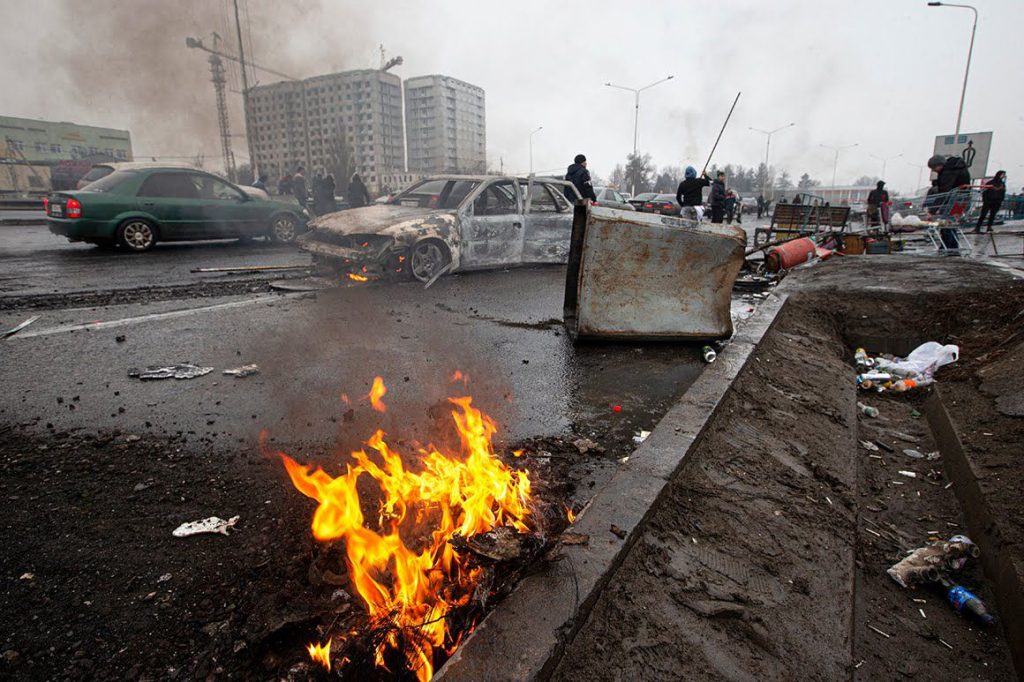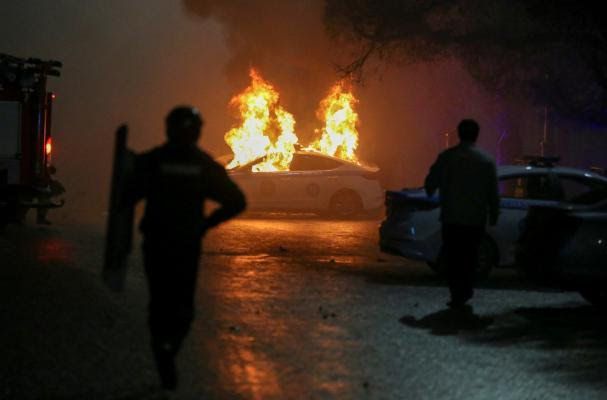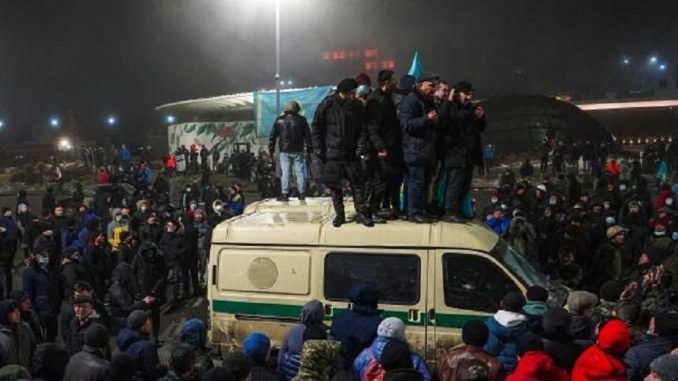
In the first days of January a new rebellion shook the world. The workers and people of Kazakhstan revolted. The trigger was an increase in gas prices. Decades of social necessities and the lack of democratic freedoms were furiously expressed. The government had to back down from the price hike and unleashed brutal repression that continues. The workers and the youth who fought on the front lines need the broadest international solidarity.
By Ruben Tzanoff
Currently, at the top there is score settling, at the bottom there is persecution and imprisonment. Russian imperialism plays a leading role in the region, while the Western powers remain silent or endorse the repression for economic interests. We place ourselves unambiguously on the side of the rebellion of the Kazakh people and in their active defense against repression. At a stage in which there will be new rebellions, it is necessary to draw conclusions on the challenges posed to the most advanced elements of the working class and revolutionary socialists.
The people´s rebellion in Kazakhstan exposed the demands of the great majorities for unsatisfied social and democratic rights. It was a protest with mobilizations, clashes with the repressive forces, barricades and burning of government buildings. The people insurrected against exploitation, the plundering of natural resources, the domination of transnational corporations and corruption. The rejection of the 100% increase in the price of liquefied gas was the fuse that caused the explosion. As a result, the street protest pushed back the increases, forced the resignation of a large number of authorities and broke the current institutional framework. However, it did not succeed in defeating the repression. Social motivations were the main driving force behind the protest, but not the only ones.
Curtailed democratic freedoms
Current president Kasym Tokayev was placed in power by Nursultan Nazarbayev, a wealthy former Stalinist bureaucrat who ruled for thirty years (1990-2019) and then had himself appointed “leader of the nation” for life. The mobilization was clear about where the real leadership is, so it demanded, for the first time, “Old man, go away!” and forced the bureaucracy to push him out of the way. It targeted the top of the pyramid of the authoritarian regime, of such a dictatorial institutional system that it had banned independent unions, political parties and eliminated elementary democratic rights long ago.
The usual responses and excuses
The government responded to the protests with the declaration of a state of emergency and a violent repression. Since the beginning of the protests, 164 people have died, 12,000 have been arrested, thousands have been injured and 300 criminal investigations have been opened. Surely the real situation exceeds what was released as official information.
President Tokayev said that “the wave of riots broke out under the guise of spontaneous protests. It was clear that the main objective was to undermine the constitutional order and seize power. We are talking about a coup attempt.” The repression is justified by stirring up falsehoods such as internal and external collusion and accusations of the protesters being “terrorists.”
Several NGOs, nationalist currents and Islamic fundamentalists are active in the country, whom the government has strongly blamed for what has happened. Although they have not been playing a decisive role, it will be necessary to see how they act after the repression of the rebellion; whether they present themselves as an opposition to the government and the regime, to capitalize on the unrest and whether or not they achieve greater support from the population.
A settling of scores at the top…
Once the rebellion had been put down, President Tokayev tried to recover by two means. The first, attacking Nazarbayev, his mentor, accusing him of having favored the emergence of a “rich caste” based on the principle of granting “everything for friends and laws for others.” Earlier, the former head of the secret services Karim Masimov, very close to Nazabayev, and other officials of his entourage had been arrested. The cynical settling of scores among the elite is a reflection of the cracks that the rebellion caused in the authoritarian regime. After disappearing for several days, Nazarbayev returned to make public appearances, to call for unity around Tokayev and to assure that there are no disputes at the top of the regime.
Persecution below
The second path of recovery is the use of sophisticated Stalinist methods of defamation and provocation. The dictators of the post-Soviet countries are trying to convince the international community that the popular protest in Kazakhstan is an act of terrorist aggression by hostile external forces. Tokayev officially stated that about 20,000 foreign terrorists attacked Kazakhstan, but he could not explain how these armed militants arrived in the country or how they disappeared without a trace.
Massive repressions are escalating. Security agents break into the homes of democratic activists, beat them up and take them away in an unknown direction. They gave themselves the task of trying to “clean out” all those who, because of their civilian position, as protesters or union activists, are considered a threat to the government.
Russian imperialism as the central protagonist Fearing the scope of the protest, the authoritarian regime appealed for help from the Collective Security Treaty Organization (CSTO) made up of Russia, Armenia, Belarus, Kazakhstan, Kyrgyzstan and Tajikistan, which quickly sent troops to try to reestablish the control that the government had completely lost. The call for help synchronized with the growing fears of Vladimir Putin, who warned that he will not tolerate “color revolutions” in the space once dominated by the former USSR. He added that Russian troops will not allow Russia´s allies to be destabilized either internally or externally.
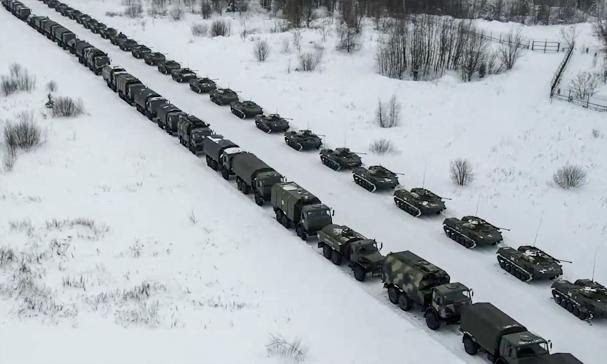
After the repression, with its toll of violence and death, Putin and his Kazakh associates announced the gradual withdrawal of troops from the CSTO within ten days. We must denounce and demand an end to the foreign military presence and Russian political interference.
Russian imperialism views with growing fear the rise of the masses in the region and the deterioration of the governments that guard its borders in the face of an increasingly offensive NATO. This complicates Putin’s expansionist plans and has forced him in recent times to invade part of Ukrainian territory and move large numbers of troops to the border, threatening total war if Ukraine is incorporated into NATO. Last year he had to come out in support of dictator Alexander Lukashenko in Belarus, who for weeks was beset by the largest mobilization in decades. And now he had to step up to support Tokayev and Nazarbayev in Kazakhstan, this time putting the CSTO into action and intervening militarily as had not happened for a long time. All this while social unrest is growing within his own country.
Clash of interests
Kazakhstan is on the chessboard of the geo-strategic movements of different powers. It is the largest country in Central Asia, with the largest uranium reserves in the world and some of the largest oil and gas reserves. It is crisscrossed by different interests, between Eastern Europe and Asia. The country was one of the fifteen republics that were part of the USSR and because of its geographical location it has communicating vessels with Turkey and with the Asian processes. Another consequence, somewhat surprising, was that the instability caused the price of cryptocurrencies to fall, since Kazakhstan is the second country in the world that produces them, only behind the United States. Power and internet outages prevented further production of these digital currencies.
Those who endorsed the repression
Despite the horror of what happened in Kazakhstan, there are new or recycled Stalinists and reformists of all stripes who shamefully refuse to condemn the repression, falsifying the reality of what has happened. Openly defending Russian and Chinese imperialist interventions because they consider them progressive in relation to European and US imperialism. These sectors have been siding with the counterrevolution against the workers and peoples in rebellion, endorsing the interference of the imperialists falsely considered “less bad”.
And there is a relative and repudiatory silence on the part of the so-called “democratic countries.” The reason is obvious: the interests of transnational capital are crossed in Kazakhstan. The United States, China, Russia, Britain, Germany and the Netherlands are extremely interested in preserving the super-profits of their companies, which have been shamelessly robbing the Kazakh people for three decades.
The imperialist bloc of the European Union propagandizes in favor of the Western powers with the cynicism typical of an aggressive foreign policy that seeks to extend its political, economic and military influence in the East, under the umbrella of NATO. US imperialism criticized the Russian interference, on the grounds of supporting the repression by the Kazakh forces. The US Secretary of State, Antony Blinken, was very clear when he stated that the Kazakh authorities and government have the capacity to deal appropriately with the protests, while maintaining law and order.
Solidarity with the workers and people of Kazakhstan
The International Socialist League published a statement expressing its political proposals in the face of the rebellion. With the continuation of the repression and persecution: The International Socialist League condemns the presence of Russian and CSTO troops and the political interference of their governments to repress the rebellion in Kazakhstan! Expressing solidarity with the working people, we demand an unconditional end to repression in all its forms and manifestations! No more arrests, torture and murders! We demand the immediate release of all political prisoners, trade union and political activists, independent journalists and demonstrators! We demand the restoration of trade union and political activity on the basis of democratic rights and freedoms! An independent international commission must investigate the crimes committed by the state, which must be punished!
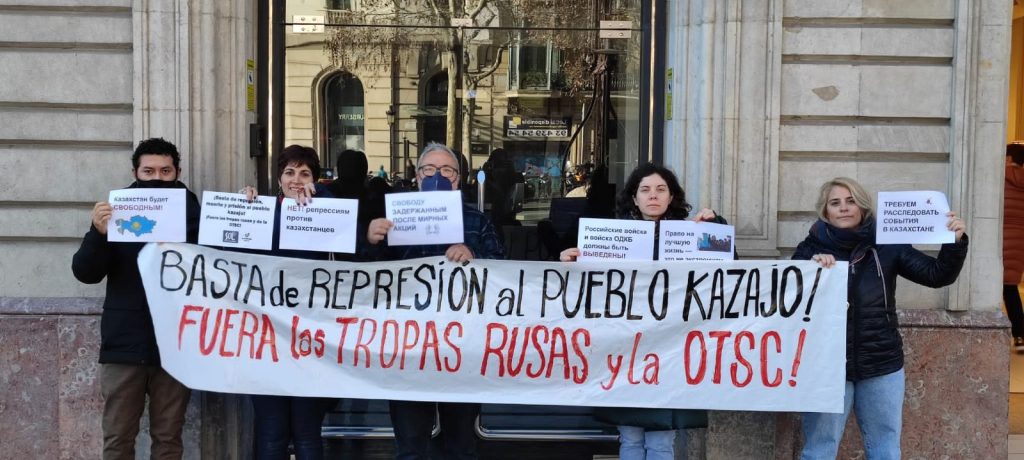
In Kiev, London, Barcelona and other cities, actions of condemnation were carried out; these are examples that need to be replicated. We need to multiply the statements and actions of human rights organizations, trade union and political organizations. Disseminating what happened in social networks and actions that can be held at the embassies or consulates of Kazakhstan and Russia are a valuable show of support for the Kazakh people. The internationalist solidarity must continue. At the same time, it is essential to draw instrumental conclusions to face the strategic challenges ahead.
A period of new rebellions
Large popular mobilizations such as those in Belarus and Kazakhstan suffered violent repression, killings and imprisonments by the government and the regime. Mass actions were even paralyzed. They achieved this on the basis of repression and not by satisfying the most elementary social and democratic needs, which will continue to worsen as the economic crisis, crossed by the continuity of the pandemic, imposes more and worse austerity measures. The contradictions will continue to deepen, as will the discontent over living conditions and the lack of democratic freedoms. With capitalism in its stage of decadence, these governments and regimes cannot offer progressive answers to the needs of the working people. Beyond the different moments that the struggle goes through, more favorable or difficult, it is necessary to stand in solidarity with the people who rebelled, because the of class struggle will always have the last word on what the future holds.
Drawing conclusions from the past to change the future
The heroic demands in Belarus and Kazakhstan have a limit: the absence of consistent revolutionary leaderships. This is the great weakness to be overcome in all the processes of struggle. In order to triumph and prevent dissatisfaction with the governments of the region from feeding other reactionary, fundamentalist or pro-US alternatives, it is necessary to help the vanguard of the working class and the youth to build their own organizations of struggle and begin to build revolutionary socialist parties. To advance in a strategic way out, the challenge for future struggles is to go beyond the semi-insurrections that repeat over and over again. In order to triumph it is necessary that the massive mobilizations and the general strike be endowed with democratic and independent decision-making bodies, with organized self-defense and with the working class leading the people. And, fundamentally, with a revolutionary, socialist and internationalist leadership in command, completely removed from the authoritarianism, corruption and betrayals of the Stalinist bureaucrats who soiled the banners of socialism. To build organizations that propose a workers´ government -without exploitation and oppression- and socialism, is the daily task that we face from the International Socialist League and all the parties and groups that are part of it.









